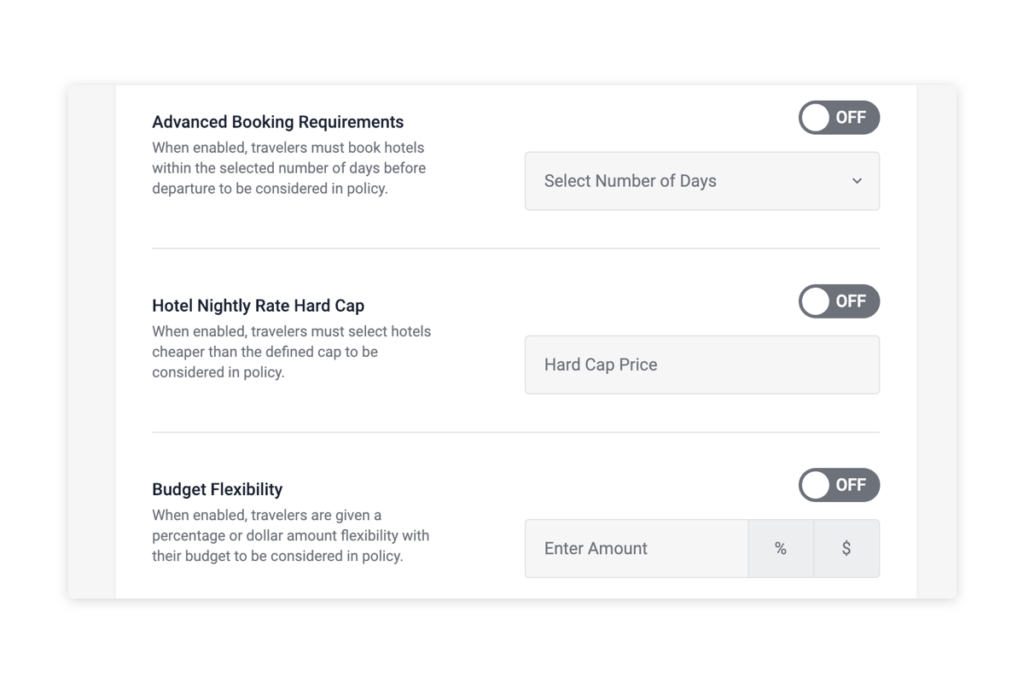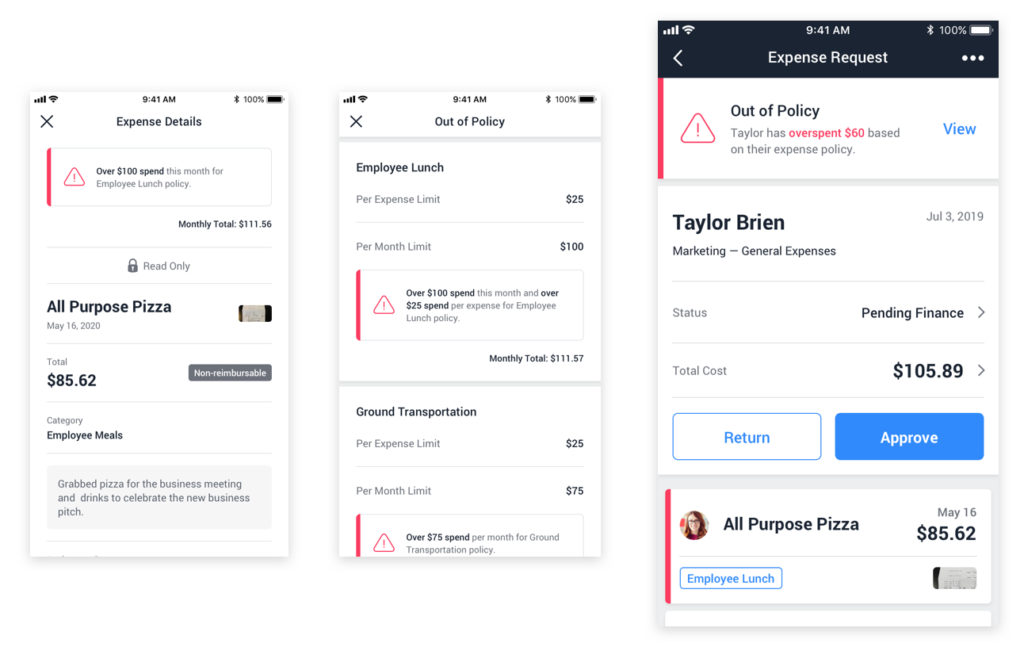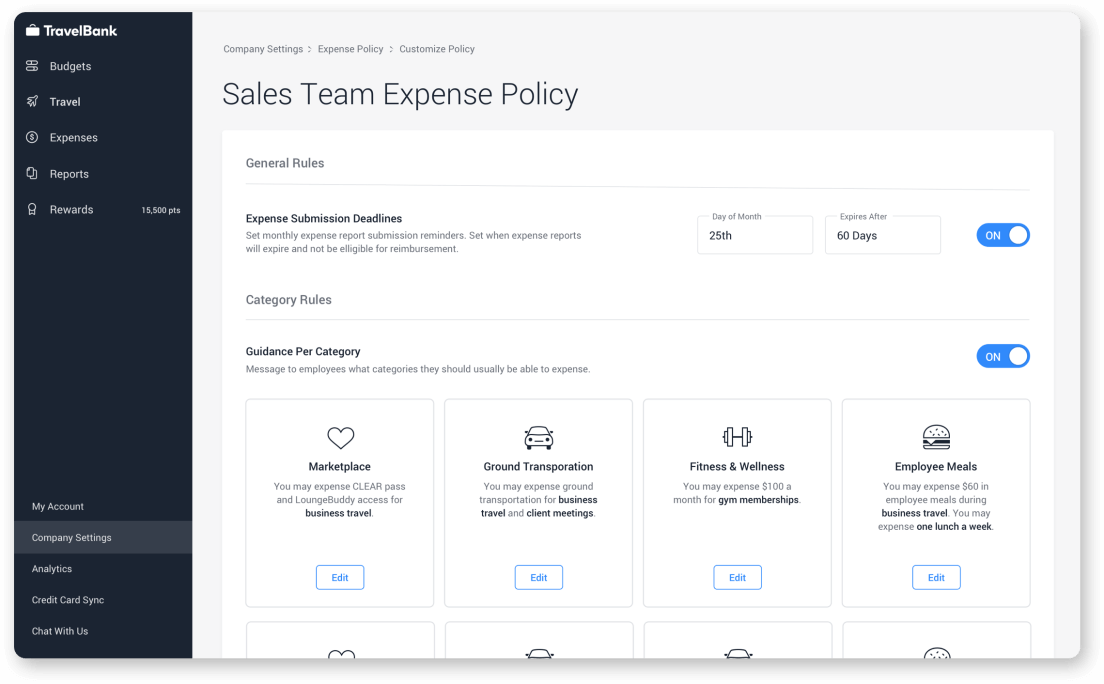When it comes to business operations, there’s no such thing as perfect. Reviewing and improving policies over time helps you adapt and adjust to stay current. For a multifaceted program like business travel, it helps to go into reviews with a plan. Here are some of the top questions to consider as you update your business travel policy.
Table of Contents
1. How Do You Generate Trip Budgets?
Basing budget estimates on figures from past trips can lead to inaccuracies and spend issues. Travel costs fluctuate, and pricing isn’t always easy to predict. Start each trip on firmer footing by working with an algorithm that can scan real market costs and calculate a more accurate expected budget.
2. What Determines Mode of Transportation?
When do business travelers fly, drive, or take a train? Many cases will have a straightforward answer, but sometimes a destination is doable by car, but more convenient by plane. One of the most dramatic changes in post-pandemic business travel is the exponential use of personal vehicles. Far more business travelers are now traveling in their own cars and expensing gas and mileage. If duration of the trip or employee seniority makes the difference, put this in writing for added clarity.
>> Related: Is It Cheaper for Employees to Expense Mileage? <<
3. Are Ticket Class Guidelines Clear?
Airlines seem to roll out more and more ticket classes each year. Economy, economy plus, premium, business class—do your employees know what kind of ticket to book, and when? Check your policy for clear guidelines, such as, “Senior management and travelers flying for longer than 6 hours may book
business class seats.”
4. Who Books Business Travel?
Letting travelers book their own transport and lodging can be an empowering morale booster. Most business travelers agree that it’s important to them to choose a travel itinerary that suits their schedule. This option also lowers the risk that a supervisor will make mistakes while handling travel bookings for multiple employees.
>> Related: Are Open Bookings Cheaper? <<
5. How Frequent Are Compliance Issues with Booking?
With a travel management system, you may be able to block employees from booking over budget without supervisor approval. Check how often approval requests are happening, and why. Is there a problem with budget expectations? Are travelers asking to go over by $20, or $200? Tweaking settings to allow slightly more flexibility in some cases can cut down on approval back-and-forth without compromising the overall budget.

Business travel policy adherence is probably the most important part of T&E management, and improvements in compliance generate enormous ROI. In a recent study, Forrester modeled that improving employee adherence to T&E policies from 40% to 91% could save $321,000 over 3 years.
>> Related: How to Reduce Business Travel Spending <<
6. Are Approved and Unapproved Expenses Clear?
Controlling spend is a high priority for finance managers and company leadership. Identify the main areas where you’re over budget, and ask why. Are employees overspending on meals, entertainment, or vehicle rentals? Update the business travel policy to clarify which kinds of expenses are approved for corporate trips. If some travelers prefer to extend a business trip with a few vacation days, it’s especially important to define what the company will and will not cover.

7. How Quickly Are Employees Submitting Expense Reports?
Excessive lag time to complete paperwork can indicate multiple problems. Are travelers expected to provide physical receipts, or can they submit photos? Can business travelers and finance and accounting staff access and share reports easily? Is there confusion surrounding allowable expenses, leading to unnecessary back and forth? Reimbursing employees for their expenses is important for morale, so take a delay here as a sign of a process to improve.
>> Related: T&E Policy Failures Are Costing You—Fix Them Fast <<
8. Are You Automating Reports When Possible?
Automating reports can minimize errors and make it easier to locate old records. Tracking manually generally takes significantly longer, costs more, and it exposes you to more risks. If you haven’t made the switch yet, combing through your travel program for processes you can automate can be one of your most powerful tools to save time, improve compliance, and give you greater insight into your data.
9. Does Your Business Travel Policy Leave You Vulnerable to Fraud?
Business travel always carries an element of risk. Any employee can be tempted at times to pad mileage or try to slip an expense through that they should have covered themselves.
Hopefully, any questionable expenses are due to miscommunication, rather than outright fraud. Your travel policy review is a good time to check the guidelines on approved and unapproved expenses for clarity. If you don’t have a process in place to audit expense reports, this is also your prompt to make that a priority! If you’re not checking regularly, you’re leaving yourself wide open for misuse of travel funds or outright fraud.
>> Related: Why Orgs Consistently Struggle with T&E Policy Adherence <<
10. How Can You Support Travelers More Effectively?
Many review questions will center on the company’s needs and goals, but it’s important to consider the traveler perspective, as well. No matter how comprehensive your business travel policy is, it’s dead in the water if it’s not supporting the people you trust to represent the company from afar.
The best way to increase support is to get feedback directly from your traveling employees. What parts of the business travel policy feel confusing or especially restrictive? Which trips went smoothly, and when did travelers hit snags? Did they have to solve problems on the road themselves, or did the company step in to assist? If you have ideas to add support, run them by travelers so you can make sure you’re putting your efforts where they’ll have the biggest impact.
>> Q&A: Create T&E Policies for 2025’s Fluctuating Market <<
As you go through a business travel review, you’re likely to come up with even more questions that can identify weaknesses and help you improve your travel program. Let this guide start you off to a clearer, stronger business travel policy that keeps you on budget and your travelers energized for the next trip.




